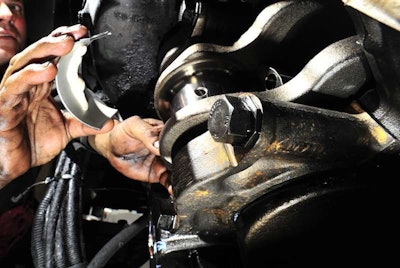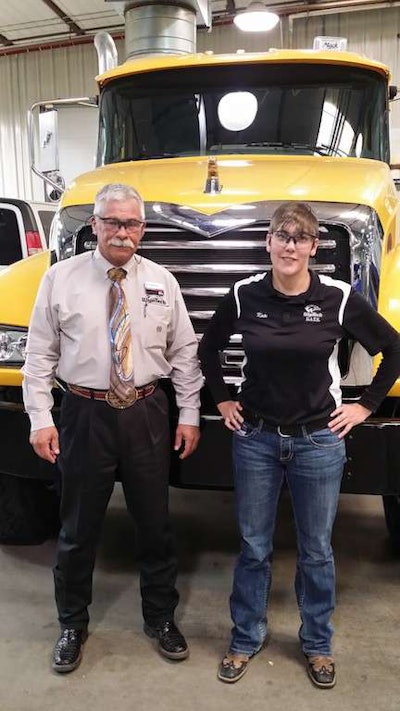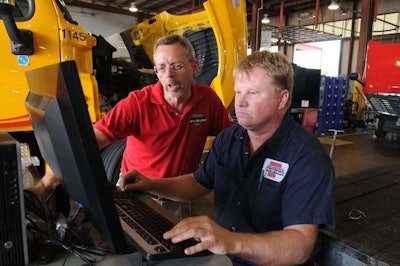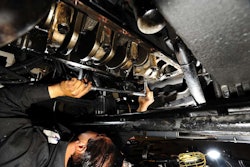This is Part 1 of a three-part series. Click here to read Part 2. Part 3 will be published Friday.

The excitement in Kate Dell’s voice is infectious. The 27-year-old Washington State native is wrapping up her education at WyoTech’s campus in Laramie, Wyo. In just a few weeks, she’ll start a new job as an entry-level diesel technician at a Mack Trucks dealership in Denver.
 Guy Warpness, president of WyoTech Laramie and one of Kate Dell’s mentors during her diesel training, says Dell represents the future of heavy-duty truck technicians
Guy Warpness, president of WyoTech Laramie and one of Kate Dell’s mentors during her diesel training, says Dell represents the future of heavy-duty truck techniciansDell’s father is a farmer and logger who shrewdly sized his daughter up a couple of years ago. “I was in college studying to be a nurse, but my dad told me he didn’t think that was a good idea” she says. “He told me, ‘Honey, I wish you’d be a diesel mechanic because you’re so much better working on inanimate objects than working with people.’”
In the early part of the last century, the majority of Americans were raised on farms where self-reliance and mechanical ability went hand-in-hand. This ready-made technically astute labor pool served the nation well as industrialization, economic booms and global conflict impacted the growing nation.
Today, things have changed considerably. The majority of Americans live in cities, and their children, in many cases, cannot drive a car with a manual transmission – much less install a pair of brake pads. College is the default educational track for most of today’s urban kids, and although their computer skills leave many a baby boomer scratching their head in bewilderment, they are reviled at the thought of getting grease under their fingernails.
Dell’s upbringing has more in common with the Greatest Generation. Although she’d done her homework before starting her education and understood clearly that she was entering a field that offered her an unlimited career track and the potential to make a good living, she was surprised by the amount of onboard computers and electronics systems on today’s trucks.
“I had no idea how fast computers are taking over trucks and how more important they’re going to be in the future,” she says. “I thought I was just going to be turning wrenches. I wasn’t aware of how important computer skills were going to be in order to accurately diagnose problems and keep these trucks rolling.”
Even in this modern age, Dell says her decision to go into a field typically seen as “men’s work” raised a lot of eyebrows. Guy Warpness, president of WyoTech Laramie and one of Dell’s mentors during her diesel training, says Dell represents the future of heavy-duty truck technicians.
“We are on the cusp of a major technician crisis in this country today,” Warpness says. “Women are an untapped resource that could help us meet that crisis head-on and eventually turn it around. But if this industry doesn’t start thinking and acting differently – and that includes recruiting women and bringing them into the workforce as technicians – things are going to get a lot worse before they get any better.”
A ‘desperate’ situation
 Steve Arnold, left, corporate trainer for Truck Centers of Arkansas, instigated a new mentoring program designed to both help new recruits and retain existing ones.
Steve Arnold, left, corporate trainer for Truck Centers of Arkansas, instigated a new mentoring program designed to both help new recruits and retain existing ones.For most fleets, today’s technician shortage is a source of major headaches, downtime and lost revenue. “If the current trends continue, we are fast approaching a day when American consumers could see food shortages in supermarkets because trucks aren’t able to get produce to market,” says Dwight McAlexander, a retired Volvo engineer who now consults the company on maintenance issues.
While that may sound extreme, McAlexander says the numbers back him up, describing the situation as “desperate” and one that “has been getting worse for several years now.” The trucking industry isn’t attracting enough new technicians to replace those that are retiring, he says.
“That’s not factoring in the fact that trucking is just not seen as an attractive career opportunity,” McAlexander says. The American Trucking Associations predicts a shortage of between 5,000 and 10,000 heavy-duty diesel technicians in the next five years. “This is a problem that is about to get exponentially worse,” he says.
It all boils down to image and pay, says Chuck Roberts, who heads the Automotive Youth Education System for the National Institute for Automotive Service Excellence. “Image has always been a problem for the automotive service industry in the broadest sense possible – that ‘grease monkey’ stereotype – and I don’t think that’s been helped by educational policy in this company,” Roberts says. “The high value placed on college prep paths hurts technology education.”
| “This is a problem that is about to get exponentially worse,” he says. |
The education system moved away from placing value on trades as a career path in the 1960s, Roberts says. “Not a lot has changed since then, and the country as a whole is about to pay a high price for those policies,” he says.
The traditional image of a technician is mired firmly in the 1940s and 1950s, McAlexander says. “What’s worse, trucking is at a disadvantage when it comes to pulling from the pool of students who do want to work with their hands today,” he says. “We have to fight and compete for the same student who wants to work on computers or in aviation, automotive, marine, motorcycles or construction equipment, and frankly, trucking is the least attractive industry of that bunch.”
Another problem is the misunderstanding that today’s students have about their earning potential as a heavy-duty diesel mechanic. Statistics posted by the U.S. Department of Labor, which are used by educational facilities to help students decide on career paths, currently show the median pay for heavy-duty truck technicians to be about $50,000 a year.
“We have got to work as an industry to change those stats,” McAlexander says. “If you go to a large truck dealer in a large market today, it is not unusual for a master technician at that dealership to be making more than $100,000 a year. As an industry, we’ve had a difficult time trying to get that data updated.” Technical schools are restricted by the U.S. Department of Education from providing students with earning potential statistics outside of those approved by DOL, he says.
While the pay structure for today’s technicians is reasonable, it doesn’t get communicated to students, says Ken Calhoun, vice president of customer relations for Truck Centers of Arkansas, a Freightliner dealer based in North Little Rock. “Nor does the fact that there are viable career paths for beyond turning wrenches forever,” says Calhoun, who should know since he used to take a toolbox to work himself years ago.
“I’m in management today, and I’ll bet if you took a poll at the next TMC meeting and asked everyone in a room making a six-figure income to raise their hand, you’d be amazed at the response,” he says. “Almost every one of the people with their hand in the air would tell you they started out as a diesel technician.”
Dell is aware of the earning potential her new career offers. “Getting my Master Certification is my next big step,” she says. “I eventually want to get into management, and I know that’s a viable goal in this industry.”
McAlexander says that if the educational system can’t deliver an accurate message about technician careers, the trucking industry has to step up. “We are way past the point where truck dealers and fleet managers need to be actively engaged on the local level,” he says. “We’ve got to start young. If we’re talking to kids who are already in technical colleges, it’s too late. We need to be reaching out to them in 7th, 8th and 9th grade, and we need to tell them, ‘I hire technicians, and this is what I’m prepared to pay, and this is what I make today.’ ”
Click here to see Part 2 of this series. Part 3 will be published Friday.









